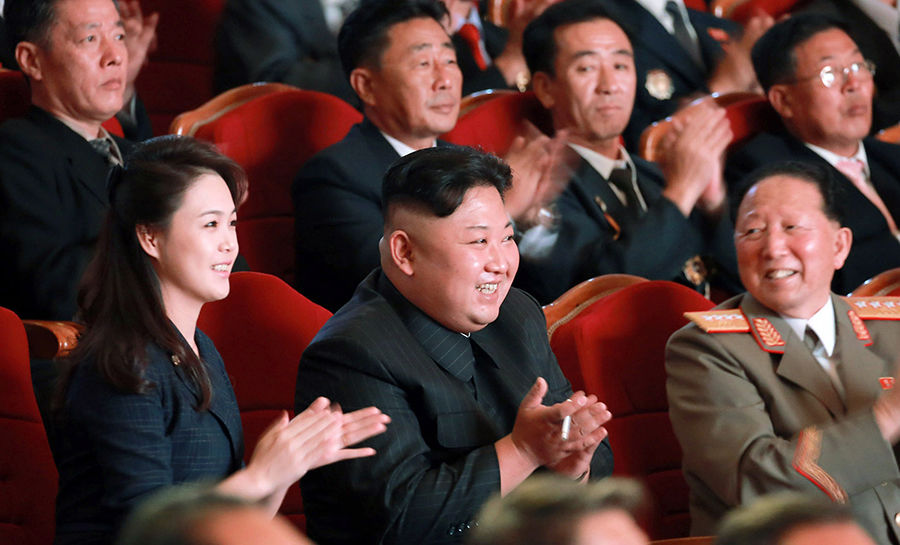A senior Vatican cardinal on Nov. 10 indicated that Rome is seeking to open a direct channel of communication with the regime of Kim Jong Un in North Korea, working through the Catholic bishops in South Korea as part of a bid to help ease the tensions surrounding the possibility of a nuclear standoff with the United States.
“The dicastery is already in communication with the Korean episcopal conference to see how we may have contact also with the regime on the other side. ... We cannot say right now exactly when this contact will happen,” said Cardinal Peter Turkson of Ghana, prefect of the Vatican’s Dicastery for Promoting Integral Human Development and often a go-to figure for Pope Francis as a global troubleshooter.
“We are exploring the possibilities of speaking to them directly,” Cardinal Turkson said, referring to Kim and his advisers.
Of course, given the legendary suspiciousness of outsiders in North Korea, especially any force perceived as offering an alternative worldview and set of values to the national ideology of “Juche,” or “self-reliance,” it may be the longest of shots that people close to Kim would even pick up the phone if the Vatican calls, let alone adjust their decisions in light of whatever the Vatican may have to say.
The Holy See does not have diplomatic relations with North Korea, so there’s no formal exchange, and in trying to establish an informal way of breaking the ice, the Vatican will have to be conscious of not inadvertently handing the Kim regime a propaganda coup. The last thing they want is for Cardinal Turkson, or some other senior official, to end up looking like Dennis Rodman in a cassock.
Nevertheless, given what’s at stake, it’s certainly worth making the effort. Perhaps Pope Francis, as the first non-Western pope in a long time, and a figure whose sympathy for the underdog is the stuff of legend, can succeed where others have failed.
If the Vatican somehow is able to establish a line of communication with Pyongyang, obviously the conversation will start with the current crisis and what needs to be done to avoid an armed conflict between nuclear powers. It doesn’t have to end there, however, because there’s lots more to discuss, prominently including the fate of the country’s anguished Christian minority.
North Korea is widely regarded as the world’s leading persecutor of Christians. Indeed, some observers regard the isolated state as occupying a category all by itself, engaging in systematic barbarity against Christians and other perceived enemies reminiscent of the world’s most appalling chapters of inhumanity, such as Treblinka and the killing fields of Cambodia.
Open Doors, a nondenominational watchdog group on anti-Christian persecution of Protestant origins, has placed North Korea at the top of its annual “World Watch” list of the worst offenders for each of the last 15 years. The organization believes there are somewhere between 200,000 to a half-million Christians in North Korea, at least a quarter of whom are currently languishing in prison camps.
Defectors from North Korea often tell stories of anti-Christian atrocities that almost defy belief. In 2005, for example, a member of the army who escaped to the West told a respected human rights investigator that his unit had been dispatched to a village where members of the local Christian church were refusing to take part in the national cult around the Kim dynasty.
According to this soldier, the unit rounded up the church’s pastor, two assistant pastors and two elders. The five bound men were placed in front of the bulldozer and given a final chance to renounce their Christian faith. When they refused, the soldier said, they were crushed to death in front of their congregation.
It wasn’t always this way. In the early 20th century, Pyongyang was known as the “Jerusalem of the East” because of its thriving Christian population, composed of a mix of Western missionaries and growing numbers of native converts.
In 1910, Korean Christians numbered more than 200,000, two-thirds of them Presbyterians and Methodists, in a country of approximately 13 million people, and most of them were located in what’s now North Korea. There were more than 2,000 churches in the country in 1942, again mostly in the north. There was even a “Great Pyongyang Revival” that helped spread the faith across the country and into other parts of Asia.
Now, all that seems a distant memory. The anti-Christian animus is so strong in North Korea today that even people with Christian grandparents are frozen out of the most important jobs — a grand irony, given that the mother of revered founder Kim Il Sung was a Presbyterian deaconess.
Granted, the treatment of Christians in North Korea is part of a broader absence of even rudimentary notions of human rights, a reality that afflicts other groups as well, prominently including perceived political dissidents.
Granted, too, directly challenging the North Korean regime over such matters has often proven counterproductive, risking making life even worse (if that’s possible) for the people outside forces are trying to help.
Still, the suffering of the country’s Christians is a reminder that while the current nuclear crisis may be a point of departure for talks with Pyongyang, it doesn’t also have to be the point of arrival. There’s plenty more to talk about, and all those Christians in camps would doubtless be grateful if space can be made for them, too, on the agenda.
>

